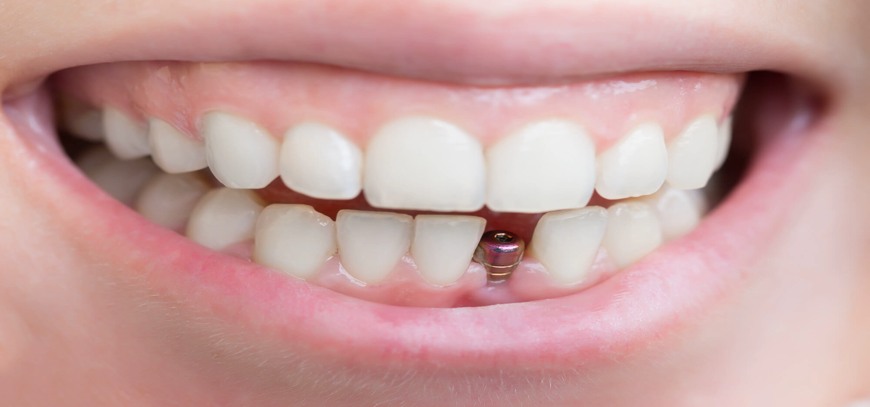Dental Implants

A dental implant is a long-term solution for replacing missing teeth. Your dentist places them directly into your jawbone, where they provide an artificial replacement for the root of your missing tooth or teeth. They can support crowns or dentures, in a similar way that roots support natural teeth. Having missing teeth can really knock your confidence, as well as affect the way you eat and speak. Dental implants offer a long-lasting and discreet choice of treatment for replacing teeth.
A dental implant itself is a titanium screw, which is placed directly into your jawbone, replacing your missing tooth root. After it’s fitted, the bone surrounding your implant will gradually fuse to it, holding the implant firmly in place. A false tooth (a crown or denture) is then fitted to the top of the implant (the abutment), giving a natural look to your smile.
Implants safe consideration
Implants are a safe, well-established treatment. It’s probably true to say that implants, much like natural teeth, will last for as long as you care for them.
How well you look after your implants – and whether you go for your regular maintenance appointments – will have the biggest impact on how long they will last.
If you don’t look after your implants they will develop a coating similar to what you get on neglected natural teeth. Left untreated, this can lead to gum infection, bleeding, soreness and general discomfort. You could get all these problems with natural teeth.
If your implants are well looked after, and if the bone they are fitted to is strong and healthy, you can expect them to last for many years. However, just as with other surgical implants (such as a hip replacement) there is no lifetime guarantee.
What dental implants can do for you
Replace a single or several missing teeth Improved appearance by eliminating the need for dentures increase confidence and self esteem support bridges and dentures enhances comfort as it confiscates messy adhesives used for dentures eradicates further damage to adjoining teeth unlike with bridges.
Implants are very durable and will need a number of appointments to ensure each procedure is implemented, from when the implant is placed into your jaw under a local anaesthetic to when the tooth is attached.
Dental implants are usually fitted during two separate procedures; the first being to fit the implant itself into your jawbone, and then the second a few months later to fit the new tooth onto the implant.
You’ll usually be able to have the procedure in your dentist’s surgery, under local anaesthesia. Tell our dentist if you’re feeling particularly anxious about treatment, as they might be able to offer you a sedative to help you relax
Dental implants are suitable for most adults who are in good general health and have healthy gums. They aren’t suitable for children and young people under 18 because the underlying bones are still growing.
Our dentist may not recommend dental implants if you:
Are a smoker
Have had radiotherapy to your jaw area
Have diabetes which isn’t well-controlled
Suffer with gum (periodontal) disease
However, each case is different. Tell our dentist about any medical problems you have, and they’ll let you know if implants are an option for you.
Placing an implant is often easier than taking a tooth out and is usually done using a simple local anaesthetic. You will not feel any pain at the time but, just like after an extraction, you may feel some discomfort during the week after the surgery.
Sometimes our dentist might give you a sedative if you are very nervous or if the case is a complicated one. General anaesthetics are rarely used for implants and are generally only used for very complicated cases..
